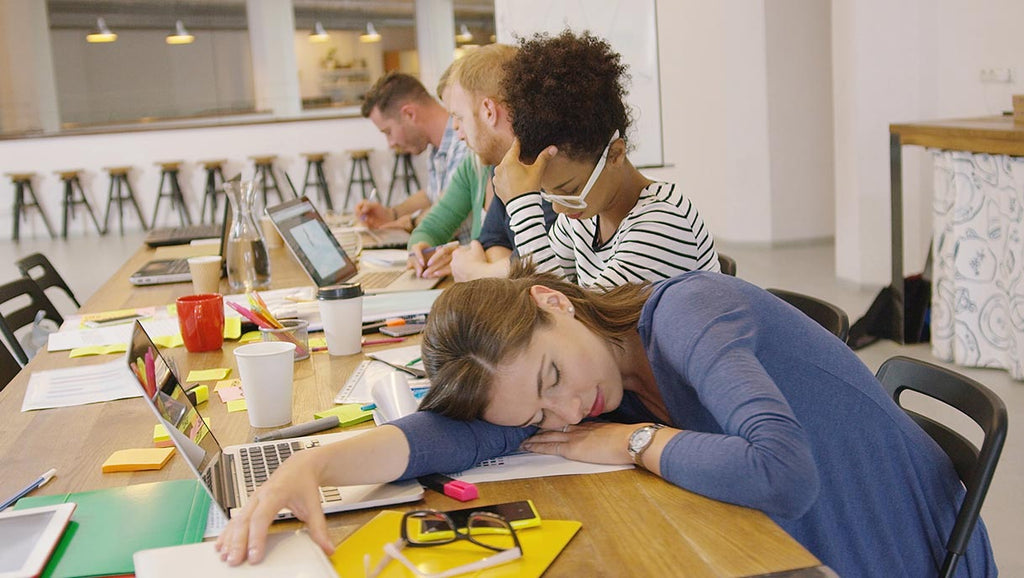
A recent study has suggested that 1 in 3 Australians suffer from sleep deprivation.
This might not come as a surprise to some but it isn't something we should ignore. Although we often idolise those who can work hard and wake up early every day before work; it might not be healthy. Having a couple extra hours of sleep each night could not only make you feel better but it might help you live longer, work more efficient and overall have a better quality of life.

Do you wake up tired during the week and then have a long sleep-in on the weekends? This might be the first sign of sleep deprivation. Although sleeping-in isn’t unhealthy, it might be a sign that during the week you aren’t giving yourself enough hours of sleep.
Sleep deprived people tend to wake up tired, go to bed late, and often go to work when they are sick.

When you are deprived of sleep, your brain cannot function to its full capacity and can often struggle to recognise their own health. The study also shows a correlation between sleep deprived individuals and those who have electronic devices (phones, tablets & computers) in their bedrooms while they sleep.
The University of Adelaide sleep specialist Robert Adams suggested that poor sleep was taking a serious toll on Australians’ health and welfare.
A study in the Journal of Sleep Medicine found that 31% of survey respondents were suffering social jetlag.
Chronic sleep deprivation has been linked to a range of health issues, such as; depression, decreased libido, obesity, heart disease, high blood pressure and fatigue.

Uncontrolled emotions 😠
When you are suffering from sleep deprivation, your brain is unable to keep up with emotional complexities such as reasoning and processing. This can often cause you to have a shorter temper than usual and to be less patient.
Low immune response 💊
Being sleep deprived weakens the immune system which increases the chance of catching colds, flu and other infections.
Bad mood 😡
Our brain needs to replenish neurotransmitters such as; serotonin and dopamine. With insufficient rest, our brains become depleted and cannot function as normal, often causing mood swings.
Weird food cravings 🍲
Without proper sleep, our brains switch into a different mode to combat fatigue. This includes cravings for foods high in energy, even at strange times.
Fitness and losing weight 💪
If you are trying to lose weight or working out at the gym to build muscle and you are not seeing the results like you usually do, it might be because of your sleep schedule. Sleep is very important for repair and growth of muscle tissue.
Decreased performance 👎
As you all have probably witnessed, sleep deprivation decreases clarity, motivation, reasoning and memory. This is why it is important to rest when driving for long periods of time. Although it might seem counterproductive; sleeping more will likely increase your productivity at work.
Low Libido 🏩
A study by the American Medical Association showed that men who regularly sleep less than 5 hours each night over a long period of time have much lower testosterone levels than normal. Results showed that their testosterone levels plummeted to levels similarly seen in men 10-15 years older than them.

So what is the solution?
Although there is no precise solution to solve sleep deprivation, as each individual has their own sleeping rituals and habits. The Sleep Health Foundation recommends those who are suffering from sleep deprivation to go to bed regularly, go to bed slightly earlier, wake up slightly later and reduce long sleep-ins. Our bodies have their own routine, so it is best to stick to a schedule and slowly change your behaviours instead of having an irregular sleeping pattern. It is also important to not compare your own sleeping patterns with others. New research has shown that there is a genetic basis for the difference in sleeping patterns and vulnerability to the impact of sleep deprivation. The best thing to do is to listen to your own body and make individual changes based on how you feel.

